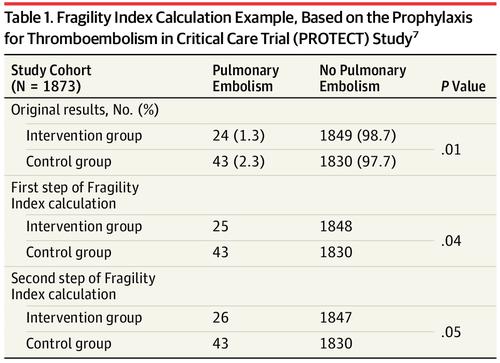当前位置:
X-MOL 学术
›
JAMA Surg.
›
论文详情
Our official English website, www.x-mol.net, welcomes your feedback! (Note: you will need to create a separate account there.)
The Fragility Index in Randomized Clinical Trials as a Means of Optimizing Patient Care.
JAMA Surgery ( IF 16.9 ) Pub Date : 2019-01-01 , DOI: 10.1001/jamasurg.2018.4318 Christopher J Tignanelli 1 , Lena M Napolitano 2
JAMA Surgery ( IF 16.9 ) Pub Date : 2019-01-01 , DOI: 10.1001/jamasurg.2018.4318 Christopher J Tignanelli 1 , Lena M Napolitano 2
Affiliation

|
Importance
The Fragility Index (FI) is the minimum number of participants in a randomized clinical trial (RCT) whose status would have to change from a nonevent (not experiencing the primary end point) to an event (experiencing the primary end point) required to turn a statistically significant result to a nonsignificant result. The FI measures the robustness (or fragility) of the results of an RCT and is an important aid to the clinician's interpretation of RCT results. It has now been recognized that RCTs, which provide the foundation for treatment guideline recommendations, may not be robust.
Observations
Most RCTs in surgery and general medicine are fragile (with a low FI score), in contrast to those in cardiac disease and heart failure, where most RCTs are robust (with high FI scores). For clinical trials of trauma, we identified that the median (interquartile range) FI score was 3 (1-8), which means that adding 3 events to the opposite treatment arm in a given RCT eliminated statistical significance. The median Fragility Quotient (the FI score divided by the total study sample size) was 0.016 (0.0043-0.0408).
Conclusions and Relevance
The provision of high-quality, evidence-based clinical care in surgery for optimal patient outcomes requires a foundation of robust clinical research evidence, and knowledge of the FI will assist in future surgical RCT design. We strongly recommend the routine reporting of FI scores for all future trauma and surgical RCTs to assist in appropriate and optimal decision making in the care of patients who have experienced trauma and/or need surgery. We also recommend the routine inclusion of the FI score in the development of clinical guidelines to assist the clinician in ascertaining whether guideline recommendations are robust. Surgeons should be aware to particularly exercise caution when considering a potential change in clinical practice based on RCTs with a low FI score.
中文翻译:

随机临床试验中的脆弱性指数作为优化患者护理的一种手段。
重要性 脆弱性指数 (FI) 是随机临床试验 (RCT) 中参与者的最小数量,其状态必须从非事件(未经历主要终点)变为事件(经历主要终点)所需的将统计上显着的结果变为不显着的结果。FI 衡量 RCT 结果的稳健性(或脆弱性),是临床医生解释 RCT 结果的重要帮助。现在已经认识到,为治疗指南建议提供基础的 RCT 可能并不可靠。观察 大多数外科和普通内科 RCT 都是脆弱的(FI 评分低),而心脏病和心力衰竭中的大多数 RCT 是稳健的(FI 评分高)。对于创伤的临床试验,我们发现中位数(四分位距)FI 评分为 3 (1-8),这意味着在给定的 RCT 中向相反治疗组添加 3 个事件消除了统计学意义。中位脆弱性商数(FI 分数除以总研究样本量)为 0.016 (0.0043-0.0408)。结论和相关性 在手术中提供高质量、循证临床护理以实现最佳患者预后需要强有力的临床研究证据的基础,而对 FI 的了解将有助于未来的手术 RCT 设计。我们强烈建议对未来所有创伤和手术 RCT 的 FI 评分进行常规报告,以帮助在治疗经历过创伤和/或需要手术的患者时做出适当和最佳的决策。我们还建议在制定临床指南时常规纳入 FI 评分,以帮助临床医生确定指南建议是否可靠。外科医生在考虑基于低 FI 评分的 RCT 的临床实践的潜在变化时应特别谨慎。
更新日期:2019-01-17
中文翻译:

随机临床试验中的脆弱性指数作为优化患者护理的一种手段。
重要性 脆弱性指数 (FI) 是随机临床试验 (RCT) 中参与者的最小数量,其状态必须从非事件(未经历主要终点)变为事件(经历主要终点)所需的将统计上显着的结果变为不显着的结果。FI 衡量 RCT 结果的稳健性(或脆弱性),是临床医生解释 RCT 结果的重要帮助。现在已经认识到,为治疗指南建议提供基础的 RCT 可能并不可靠。观察 大多数外科和普通内科 RCT 都是脆弱的(FI 评分低),而心脏病和心力衰竭中的大多数 RCT 是稳健的(FI 评分高)。对于创伤的临床试验,我们发现中位数(四分位距)FI 评分为 3 (1-8),这意味着在给定的 RCT 中向相反治疗组添加 3 个事件消除了统计学意义。中位脆弱性商数(FI 分数除以总研究样本量)为 0.016 (0.0043-0.0408)。结论和相关性 在手术中提供高质量、循证临床护理以实现最佳患者预后需要强有力的临床研究证据的基础,而对 FI 的了解将有助于未来的手术 RCT 设计。我们强烈建议对未来所有创伤和手术 RCT 的 FI 评分进行常规报告,以帮助在治疗经历过创伤和/或需要手术的患者时做出适当和最佳的决策。我们还建议在制定临床指南时常规纳入 FI 评分,以帮助临床医生确定指南建议是否可靠。外科医生在考虑基于低 FI 评分的 RCT 的临床实践的潜在变化时应特别谨慎。


























 京公网安备 11010802027423号
京公网安备 11010802027423号